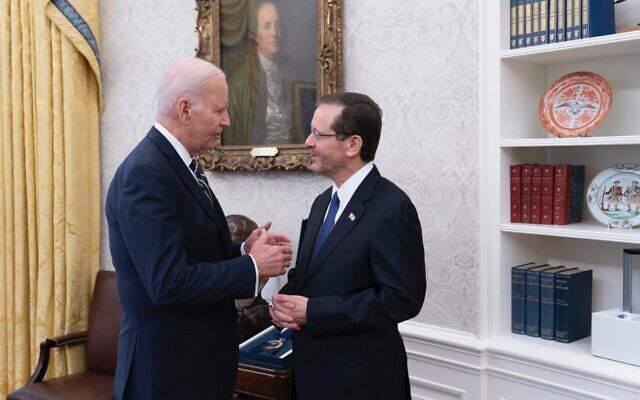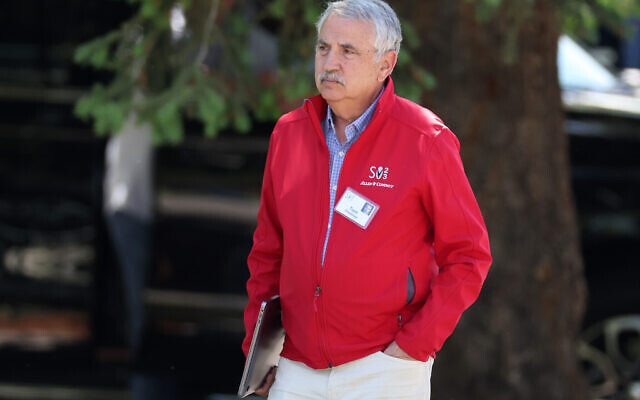New York Times columnist and author Thomas Friedman said he believes US President Joe Biden’s recent warning that the Israeli government’s judicial overhaul push could harm the US-Israel “special relationship” was conveyed to Prime Minister Benjamin Netanyahu during their call on Monday.
Friedman spoke to Army Radio on Thursday, two days after Biden gave an interview to the Times columnist in which he noted the “enduring protest movement that is demonstrating the vibrancy of Israel’s democracy, which must remain the core of our bilateral relationship.”
The Times interview on Tuesday came a day after Biden and Netanyahu spoke by phone, and was reportedly initiated by the president to refute some of the content of the call with Netanyahu the administration felt was misrepresented by the Prime Minister’s Office.
Biden also shared his concerns on the judicial overhaul with a visiting President Isaac Herzog during their private meeting in Washington on Tuesday, Friedman said. The purpose of Biden’s interview was to ensure that Israelis also got that message, the columnist added.
“The president wanted to be sure, having spoken to the prime minister of Israel, and the president of Israel, that he also found a way to speak to the people of Israel, directly, and that was really the motivation for our interview,” Friedman told Army Radio on Thursday.
According to Friedman, Biden wanted to express that if the judicial overhaul proposals are passed, “you’d be breaking one of the most important bonds between the United States and Israel, our shared values around democratic decision-making and an independent judiciary.”

Prime Minister Benjamin Netanyahu attends a memorial ceremony for Zionist leader Ze’ev Jabotinsky at Mount Herzl, in Jerusalem on July 18, 2023. (Noam Revkin Fenton/Flash90)
It is Biden’s “deep worry” that such a process of reigning in the judiciary cannot be reversed, Friedman said. For the US, “it doesn’t make sense” that Israel would want to change its system when it boasts such a successful and attractive economy, according to the columnist.
Biden has repeatedly spoken out against the Netanyahu government’s ongoing judicial overhaul plan, which has been met with months of mass protests from critics who say it will radically weaken the court’s power to act as a check and balance against the Knesset, and dangerously erode Israel’s democratic foundations.
In its readout of Monday’s call, Netanyahu’s PMO described “a warm and long” conversation between the two leaders and said Biden had agreed to meet with Netanyahu, following seven months of refraining from inviting him to Washington over the administration’s ongoing displeasure with the hardline coalition’s judicial overhaul plans and Jerusalem’s policies in the West Bank.
Notably, no invitation was mentioned in the White House readout of the call, which emphasized, among other matters, the US president’s ongoing concern about the judicial overhaul and “the need for the broadest possible consensus.”
On Wednesday, Hebrew-language news site Walla reported that the Biden administration was displeased with how Netanyahu’s office portrayed their conversation and wanted to “correct” some of the impressions from the Israeli readout.
The administration was also reportedly miffed after National Security Adviser Tzachi Hanegbi on Wednesday responded to Friedman’s column, saying that the remarks attributed to Biden “were not at all mentioned in the conversation” between the president and Netanyahu, though Friedman’s piece did not imply that they had been.

National Security Adviser Tzachi Hanegbi arrives for the weekly cabinet meeting at the Prime Minister’s Office in Jerusalem on May 7, 2023. (Yonatan Sindel/Flash90)
Hanegbi said the phone call “as depicted by both sides, was ‘positive, warm, and constructive,’” and added that the government would see through its current legislative push to severely curtail judicial review over the reasonableness of governmental decisions next week, before “pursuing broad public consensus regarding the remainder of the process” during the Knesset’s summer recess.
The coalition is seeking to change the representation on the panel that chooses court judges, giving the government a majority say. According to Hanegbi, Netanyahu told Biden that during the Knesset recess, he would make great efforts to reach a “broad public consensus” on how judges are selected.
An unnamed senior US official told Walla that the administration “wanted to make clear that the fact Biden spoke with Bibi [Netanyahu] about a possible meeting doesn’t mean we don’t care about the judicial overhaul. They should make no mistake – Biden has strong feelings about this and made it clear in a 1,000 ways.”
On Wednesday, the White House further reiterated that Friedman’s Tuesday piece “directly quoted the president” and that Biden’s “comments in the article stand for [themselves].”
The president, said White House press secretary Karine Jean-Pierre, has been “very clear” about the need for consensus. “When it comes to our relationship with Israel, the US relationship with Israel… at the core is democratic values, and that’s what we believe. And any changes — any major changes certainly — need… a broad consensus,” added Jean-Pierre.

President Joe Biden and Israel’s President Isaac Herzog speak in the Roosevelt Room of the White House in Washington, July 18, 2023. (Chris Kleponis)
In his interview with Army Radio Thursday, Friedman said that according to his understanding of his conversation with Biden, the president’s invitation for Netanyahu to visit did not mention the meeting being held in the White House, though the president did see value in a meeting nonetheless.
Hanegbi had claimed the invite was to the White House.
“He wanted to defuse this issue of Bibi come, Bibi go,” Friedman said, emphasizing that there was “no commitment on any venue.”

Tom Friedman leaves a session at the Allen & Company Sun Valley Conference on July 12, 2023 in Sun Valley, Idaho. (Kevin Dietsch / Getty Images via AFP)
Despite returning to office over six months ago, Netanyahu has yet to receive an invite to the White House. In late March, Biden said Netanyahu would not be visiting him in the “near term” amid Washington’s frustration with the overhaul plan.
Friedman said he believed that it was difficult for politicians like Biden to understand the pursuit of the overhaul by Netanyahu, who was seen for many years as a “once-in-a-generation political talent.”
Some critics of the overhaul, such as former attorney general Avichai Mandelblit, think Netanyahu’s push to advance the bills is linked to a desire to bring a swift end to his corruption trial.
“How does that guy find himself taking orders from, what’s his name? Yair Levin?” Friedman said, appearing to confuse the name of Justice Minister Yariv Levin, the architect of the overhaul. “Sorry, I don’t even know his name.”

Prime Minister Benjamin Netanyahu speaks with Minister of Justice Yariv Levin during a Knesset plenum hearing, July 10, 2023. (Yonatan Sindel/Flash90)
Friedman stressed that Washington defends Israel at international courts at The Hague — a job made easier because “Israel has an independent judiciary that can deal with questionable military matters.”
The concern that the overhaul may lead to indictments of Israel Defense Force soldiers and officers at the International Criminal Court has led some military reservists to declare they won’t carry out their duties until the legislation is stopped.
Friedman stated that Biden has an “authentic” love for Israel, but worried that he “could well be the last pro-Israel Democratic president.”
“Of every president I’ve covered, none is more sympathetic and caring of Israel, in his beckon, in his gut, than Joe Biden. He is really worried, he is worried for Israel, he is worried for the US-Israel relationship, he is worried for American Jews and their relationship with Israel,” he said.
Friedman said that the president was discussing a close new military alliance with Saudi Arabia, which could lead to normalization with Israel — a goal long sought by Netanyahu — in exchange for some “overture” towards the Palestinians, but “that deal can only happen if the base of the Democratic Party agrees to it.”
“The very Democratic Party that Netanyahu and [former Israeli Ambassador to the US Ron] Dermer said don’t matter anymore,” referring to the notion that Netanyahu is unpopular with Democrats due in part to strains between him and Barack Obama’s administration, and his perceived alignment with the Republican Party.

File: US President Joe Biden meets then-opposition leader Benjamin Netanyahu (right) at the President’s Residence in Jerusalem, July 14, 2022. At left is Secretary of State Antony Blinken; 2nd-left is US Ambassador to Israel Tom Nides. (GPO)
A Gallup poll in March indicated that Democrats are more likely to sympathize with Palestinians than with Israelis, though a majority of Democrats still have a favorable view of Israel.
Netanyahu’s government and overhaul supporters say the overhaul legislation is needed to rein in what they see as an over-intrusive and left-leaning court system.
Last week, Friedman penned a column warning that the Biden administration was reassessing its ties with Netanyahu’s government, amid growing American alarm over the actions of the hard-right Israeli coalition.
Friedman wrote that Biden believes the government is using its judicial overhaul push as a smokescreen to engage “in unprecedented radical behavior… that is undermining our shared interests with Israel, our shared values and the vitally important shared fiction about the status of the West Bank that has kept peace hopes there just barely alive.”
The op-ed, headlined “The US Reassessment of Netanyahu’s Government Has Begun,” is the latest of several he’s published since Netanyahu’s right-wing bloc’s victory in the November elections.
This post was originally published on this site be sure to check out more of their content.








